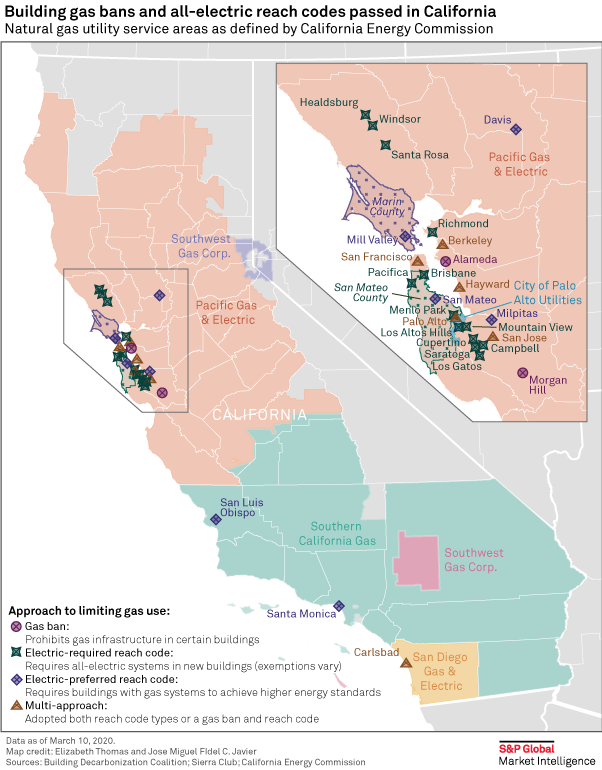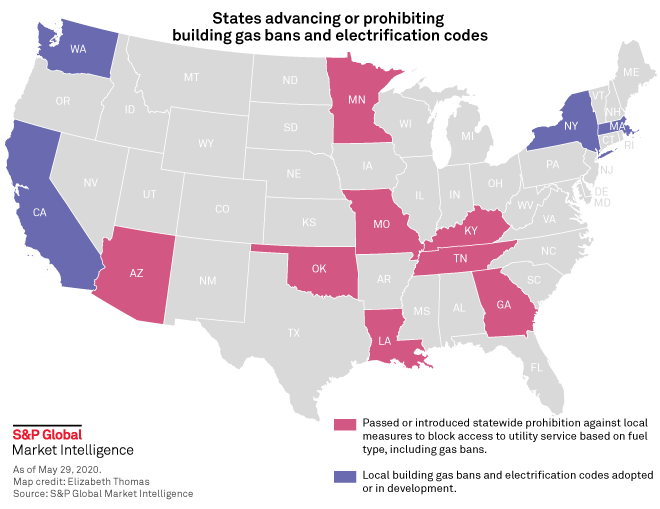The building gas ban and electrification code movement was relatively subdued in the second quarter, as local governments remained focused on the COVID-19 pandemic, its economic impacts and the nationwide protests sparked by George Floyd's death in the custody of Minneapolis police. However, even as efforts to counter the policy gain traction, building electrification backers expect a rebound in activity during the second half of 2020.
"We have about 60 more cities that are working actively on reach codes in California, and we're going to see them start to pick up again, we think, towards the end of summer," Building Decarbonization Coalition Director Panama Bartholomy said. "It's the delay due to the pandemic that we're seeing. There's no other real reason that we've heard for any kind of slowdown."
San Francisco Supervisor Rafael Mandelman aims to introduce a comprehensive all-electric building requirement around the end of June, building on the city's previous measures and continuing the momentum in the Bay Area. Bartholomy expects the movement to ramp up in Southern California, where just a handful of local governments have adopted ordinances.

On the East Coast, the Massachusetts attorney general will complete its review of a gas ban in Brookline, Mass., by July 21. Towns and cities pursuing building electrification in the Boston area see the review as a test of whether state law will trump local policies.
San Luis Obispo, Calif., gets electrification code back on track
The City Council in San Luis Obispo, Calif., advanced a revised version of its building electrification code during a June 16 webcast meeting, after a conflict-of-interest accusation stalled the proposed ordinance for the last eight months.
The measure places higher efficiency and performance requirements on new buildings with natural gas infrastructure than those with all-electric systems, discouraging builders from including gas hookups in construction projects. It passed 4-0, with City Councilwoman Andy Pease recusing herself because the California Fair Political Practices Commission had not resolved a complaint about her involvement.
The Utility Workers Union of America lodged the complaint in September 2019, claiming Pease had a conflict because she is a partner at a green building consulting firm. The city council rescheduled an April vote on the measure after the president of the union's local chapter threatened to fill the meeting with opponents, making social distancing measures unenforceable.
Southern California Gas Co. Public Affairs Manager Tim Mahoney said the ordinance was misleading, exposed residents to higher energy costs and made them more vulnerable during periodic electric power disruptions prompted by wildfire conditions.
The ordinance won support from the San Luis Obispo Chamber of Commerce because the revised version excluded previously proposed fees and included new incentives. The new version also added an exemption for gas appliances in commercial kitchens. Councilman and Vice Mayor Aaron Gomez suggested "somebody within the industry" was behind a misinformation campaign that produced a flood of calls from non-residents opposing the ordinance.
The council anticipates holding a second reading of the legislation on July 7 before sending it to the California Energy Commission for approval and implementing the ordinance in September.
Louisiana adopts anti-gas ban law; efforts in other states stall
Louisiana became the fourth U.S. state, the first with a Democratic governor, to adopt legislation that prevents local governments from adopting California-style gas bans and electrification codes.
Gov. John Bel Edwards signed Senate Bill 492 into law on June 4, prohibiting Pelican State municipalities and parishes from adopting any code, ordinance or land use restriction that blocks or restricts access to gas utility service. The law also prohibits local governments from issuing building permits that place higher fees or requirements on permits for buildings with gas infrastructure.

Unlike legislation passed in Arizona, Tennessee and Oklahoma, the Louisiana law specifies that it is meant to protect natural gas utilities. Lawmakers in other states have been candid about that goal in public comments, but their laws are broadly worded to block local governments from restricting access to utility service based on fuel type.
State legislatures in Minnesota and Missouri, where similar bills were introduced, adjourned their regular sessions in May without passing the legislation. Lawmakers in Kentucky and Georgia also introduced bills this year, but the Kentucky General Assembly adjourned in April and the procedural window for the Georgia bill has passed. Unless lawmakers take up the bills in a special session, they will have to reintroduce the legislation when the legislatures convene next year.
Colorado group aims to preempt gas bans with ballot measure
A Colorado group that supports oil and gas development is drumming up support for a ballot initiative that would prohibit local governments or the state from banning natural gas hookups in new construction. The effort by Protect Colorado to put the issue before Centennial State voters in November marks a new strategy in the ongoing battle over building electrification.
"Every day natural gas is used to heat the water we cook with and keep the lights on in Colorado homes and businesses," Protect Colorado said on its website. "Now, some groups want to take that choice away by banning natural gas in newly constructed homes and ending natural gas production in Colorado."
Electrification backers like the Rocky Mountain Institute and Sierra Club are active in Colorado, but building decarbonization efforts in the state have not followed the California model.
Cities including Boulder, Denver and Fort Collins have adopted energy benchmarking or performance ordinances for existing buildings, which could eventually support electrification. In Boulder, the building code for new construction is getting progressively stricter to reduce greenhouse gas emissions, making it more difficult to build within the code if the structure includes gas infrastructure.
Lafayette, Colo., Mayor Jamie Harkins said her city is not currently pursuing a California-style ordinance as part of its energy road map, but she opposes the ballot measure. She said it would strip local control and policy options from Lafayette, a member of Colorado Communities for Climate Action.
"Taking away a tool in our toolkit is really problematic," she said. "Any time you take away something that may prove to be effective in other places, it's just really a handicap for all of us."



